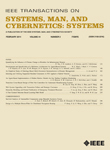Journal


IEEE Transactions on Systems, Man, and Cybernetics: Systems
Archives Papers: 618
IEEE Xplore
Please choose volume & issue:
-
Distributed Formation-Containment Control for Discrete-Time Multiagent Systems Under Dynamic Event-Triggered Transmission Scheme
Keywords:Linear matrix inequalitiesConsensus controlMulti-agent systemsLaplace equationsVehicle dynamicsTopologyShapeDiscrete-time systemsdistributed formation-containment (FC) controldynamic event-triggered (DET) protocolmultiagent systems (MASs)Abstracts:In this article, the distributed formation-containment (FC) control issue is investigated for a class of discrete-time multiagent systems (DT-MASs) under the event-triggered communication mechanism. In order to save the communication cost and improve the utilization of communication resources, a novel dynamic event-triggered (DET) mechanism is developed by adding an auxiliary variable for each agent system, which is able to dynamically adjust the triggering threshold. A distributed FC control scheme under the DET mechanism is proposed for all the leaders and followers based on the available relative outputs. The purpose of the addressed problem is to design the FC controller such that all the leaders achieve a formation shape and all the followers converge into such a convex hull. To this end, the considered DT-MASs are first decoupled into a diagonal form by resorting to the property of the Laplacian matrix as well as the inequality technique. Then, two sufficient conditions are established to ensure the desired FC performance. Furthermore, the corresponding FC controller parameters are obtained in terms of the solutions to two matrix inequalities which only depend on the maximum and minimum nonzero eigenvalues of the Laplacian matrix. Finally, an illustrative example is provided to verify the validity of the developed control scheme.
-
Adaptive Learning-Based Distributed Control of Cooperative Robot Arm Manipulation for Unknown Objects
Keywords:RobotsRobot kinematicsManipulator dynamicsPayloadsDynamicsTrajectory trackingUncertaintyControl systemscooperative systemsmanipulatorsneural network applicationsrobot dynamicsAbstracts:This article proposes a distributed cooperative manipulation control scheme for multirobot systems to track reference trajectories with unknown payload dynamics, grasp positions, and external disturbances. An online learning module is established to estimate the payload dynamics. Then a wrench-synthetic trajectory tracking control protocol is thereby developed to manipulate an object under unknown external disturbances no matter where the grasping points are. Moreover, sufficient conditions are derived to guarantee the uniform boundedness of the tracking errors of the closed-loop cooperative manipulation system. Finally, numerical simulations are conducted to substantiate the effectiveness of the proposed cooperative manipulation control scheme.
-
Secure Event-Triggered Distributed Kalman Filters for State Estimation Over Wireless Sensor Networks
Keywords:SensorsWireless sensor networksState estimationKalman filtersNoise measurementImage edge detectionTime measurementAttack analysisevent-triggered distributed Kalman filter (DKF)resilient estimationwireless sensor network (WSN)Abstracts:In this article, we analyze the adverse effects of cyber–physical attacks as well as mitigate their impacts on the event-triggered distributed Kalman filter (DKF). We first show that although event-triggered mechanisms are highly desirable, the attacker can leverage the event-triggered mechanism to cause nontriggering misbehavior, which significantly harms the network connectivity and its collective observability. We also show that an attacker can mislead the event-triggered mechanism to achieve continuous-triggering misbehavior, which not only drains the communication resources but also harms the network’s performance. An information-theoretic approach is presented next to detect attacks on both sensors and communication channels. In contrast to the existing results, the restrictive Gaussian assumption on the attack signal’s probability distribution is not required. To mitigate attacks, a meta-Bayesian approach is presented that incorporates the outcome of the attack detection mechanism to perform second-order inference. The proposed second-order inference forms confidence and trust values about the truthfulness or legitimacy of sensors’ own estimates and those of their neighbors, respectively. Each sensor communicates its confidence to its neighbors. Sensors then incorporate the confidence they receive from their neighbors and the trust they formed about their neighbors into their posterior update laws to successfully discard corrupted information. Finally, the simulation result validates the effectiveness of the presented resilient event-triggered DKF.
-
Finite-Time Distributed Control of Nonlinear Multiagent Systems via Funnel Technique
Keywords:Steady-stateTransient analysisMulti-agent systemsStandardsTrajectoryTechnological innovationStability criteriaDistributed consensusfinite-time controlfunnel controlnonlinear multiagent systems (MASs)Abstracts:This article investigates the finite-time distributed adaptive consensus for nonlinear uncertain multiagent systems (MASs). The performance of the consensus errors can be prespecified in a funnel sense. Three achievements make this work depart from available results on prespecified performance and funnel control: first, a novel error transformation is constructed to prespecify the performance, which avoids the singularity problem pointed out in the literature in the differentiation of the control law; second, the funnel control method is extended in a MAS setting by suitably modifying the backstepping technique in a power integrator sense; and third, it is shown that finite-time stability notions can be attained without extra complexity being involved in the design. Stability analysis and comparative simulations demonstrate the method.
-
Modified Kalman Filtering for Stochastic Nonlinear Systems Under Non-Gaussian–Lévy Noise and Cyber Attacks
Keywords:Kalman filtersNonlinear systemsCyberattackGaussian noiseUpper boundReal-time systemsLinear matrix inequalitiesCyber attacksmodified Kalman filternon- Gaussian–Lévy noisesaturation functionsAbstracts:This article studies the filtering problem for a class of stochastic nonlinear system under non-Gaussian–Lévy noise and cyber attacks, where the denial-of-service (DoS) attacks and the false data-injection (FDI) attacks are both considered. Since the covariance of the Lévy noise is unknown and infinite, the standard Kalman filter fails to estimate system states. By exploiting saturation functions, a modified Kalman filter is proposed, where the extremely large values of the measurement outputs caused by the Lévy noises can be clipped. In the presence of Lévy noise and cyber attacks, an upper bound for the error covariance is guaranteed and can be minimized via designing the filter parameter. Besides, a sufficient condition is provided to guarantee the boundedness of the upper bound, and the convergence analysis of the filtering error is presented. Finally, the simulation results are given to verify the algorithm.
-
Evidential Reasoning Rule With Likelihood Analysis and Perturbation Analysis
Keywords:Perturbation methodsUncertaintyRobustnessData analysisAnalytical modelsNeural networksData modelsData analysisdecision makingevidential reasoning (ER)inferential modelinglikelihood analysisperturbation analysis (PA)Abstracts:The evidential reasoning (ER) rule has been widely used in the data analysis, which provides a transparent and credible inference process and can effectively deal with various uncertainties. However, the traditional ER rule requires the evidence to be strictly independent of each other, which may not be easily satisfied in engineering practice. In addition, the perturbation can affect the sample data and cause unstable inference results. As such, in this article, a new ER rule with likelihood analysis and perturbation analysis (PA) is proposed based on the maximum likelihood ER (MAKER). The likelihood analysis is used to acquire probabilistic evidence from the sample data. The interdependence index of evidence is defined on the marginal probability and joint probability. A parameter optimization model is established based on the maximum likelihood (ML). The PA is conducted on the proposed ER rule to study its robustness, and a generalized PA method is explored to facilitate its potential applications. A case study of the performance evaluation of laser gyros is carried out to show the implementation of the proposed method and validate its effectiveness in reality.
-
Reachability, Controllability, and Stabilization of Boolean Control Networks With Stochastic Function Perturbations
Keywords:ControllabilityPerturbation methodsProbabilistic logicNonlinear systemsStochastic processesUpper boundIndexesBoolean control networks (BCNs)controllabilityreachabilitystate-feedback stabilizationstochastic function perturbations (SFPs)Abstracts:Robust controllability and stabilization are two fundamental issues in modern control theory. This article investigates the robust controllability and stabilization of Boolean control networks (BCNs) subject to stochastic function perturbations (SFPs). First, by defining the concept of the weighted path and constructing the perturbed position index matrix, the robustness analysis of reachability is divided into two cases. According to these two cases, several criteria are proposed for the robust reachability of BCNs with SFPs. Second, based on the robust reachability, the robust controllability and state-feedback stabilization of BCNs with SFPs are further studied. Finally, the validity of the obtained results is supported by examples.
-
Leader-Following Cluster Consensus of Multiagent Systems With Measurement Noise and Weighted Cooperative–Competitive Networks
Keywords:ProtocolsNoise measurementWeight measurementLaplace equationsTopologyMulti-agent systemsGraph theoryCluster consensusleader-followingmeasurement noisemultiagent systems (MASs)weighted cooperative–competitive networksAbstracts:Leader-following cluster consensus is investigated for multiagent systems with weighted cooperative–competitive networks and measurement noise. A stochastic approximation protocol is proposed for interactively balanced and sub-balanced networks, and pinning control is introduced to deal with the divergence phenomenon in interactively unbalanced networks. With these protocols, sufficient conditions for reaching a strong mean-square leader-following cluster consensus are established for all the three types of networks, which are also extended to the cases without measurement noise. Numerical examples illustrate the effectiveness of the proposed protocols and theoretical analysis.
-
A Survey on Incomplete Multiview Clustering
Keywords:Positron emission tomographyKernelGenerative adversarial networksNoise reductionMagnetic resonance imagingImage color analysisData modelsData miningincomplete multiview clustering (IMC)missing viewsmultiview learningAbstracts:Conventional multiview clustering seeks to partition data into respective groups based on the assumption that all views are fully observed. However, in practical applications, such as disease diagnosis, multimedia analysis, and recommendation system, it is common to observe that not all views of samples are available in many cases, which leads to the failure of the conventional multiview clustering methods. Clustering on such incomplete multiview data is referred to as incomplete multiview clustering (IMC). In view of the promising application prospects, the research of IMC has noticeable advances in recent years. However, there is no survey to summarize the current progresses and point out the future research directions. To this end, we review the recent studies of IMC. Importantly, we provide some frameworks to unify the corresponding IMC methods and make an in-depth comparative analysis for some representative methods from theoretical and experimental perspectives. Finally, some open problems in the IMC field are offered for researchers. The related codes are released at <uri>https://github.com/DarrenZZhang/Survey_IMC</uri>.
-
Hybrid Sampling-Based Particle Filtering With Temporal Constraints
Keywords:OptimizationTrajectoryRoadsNonlinear dynamical systemsVehicle dynamicsShapeProbability density functionHybrid samplingnonlinear dynamic systemsparticle filteringtemporal constraintsAbstracts:This article presents the state estimation problem of nonlinear dynamic stochastic systems with temporal constraints, depicting the nonlinear interval relationship between states at two successive time instants for the first time. To this end, a hybrid sampling-based particle filter (HSPF) with temporal constraints is proposed by integrating the acceptance–rejection sampling, the repeat sampling, and the sample-to-sample sampling via online optimization, where a decision criterion of improving sampling efficiency is designed to determine whether or not the repeat sampling is activated and a simple sequential quadratic programming (SSQP) is derived to mitigate the computational burden of particle optimizations. Next, compared with filters without introducing temporal constraints, we find that the number of effective particles increases, and the differential entropy of the probability density function as a measure of uncertainty is small, implying that fusing more extra information will help to improve the accuracy of estimates. Finally, two simulation scenarios verify the performance of the proposed filter with temporal constraints.
Hot Journals
- Risk Breakdown Matrix for Risk-Based Inspection of Transportation Infrastructure Projects
- Social Control in Outsourced Architectural and Engineering Design Consulting Projects: Behavioral Consequences and Motivational Mechanism
- 2022 Best Paper Award
- Hold-Ups and Failures in Negotiated Order: Unearthing the Nuances of Rework Causation in Construction
- Prevalence and Risk Factors for Poor Mental Health and Suicidal Ideation in the Nigerian Construction Industry
- Impact of Wind Load Characteristics on Computed Bridge Stay-Cable Forces Used for Bridge Health Monitoring
- Weak-End and Frequency Detection of Elastically Supported Bridges by Contact Residual Response of Two-Axle Test Vehicle in a Round Trip
- Development of Performance-Based Fragility Curves of Coastal Bridges Subjected to Extreme Wave-Induced Loads
- An Analytical Model to Evaluate Short- and Long-Term Performances of Post-Tensioned Concrete Box-Girder Bridges Rehabilitated by an Ultrahigh-Performance Concrete Overlay
- Experimental and Numerical Studies on Dynamic Response of Parallel Wire Cables Subjected to Close-In Explosions
- Three-Dimensional Velocity Distribution in Straight Smooth Channels Modeled by Modified Log-Law
- Experimental Investigation on Flow Past Two and Three Side-by-Side Inclined Cylinders
- An Experimental Investigation of Rotor–Box Aerodynamic Interaction 1
- Modeling Gas–Liquid Flow Between Rotating and Nonrotating Annular Disks
- Entry Length Requirements for Two- and Three-Dimensional Laminar Couette–Poiseuille Flows
Advanced Materials (3,745)
- Structured Perovskite Light Absorbers for Efficient and Stable Photovoltaics
- Strategies for High‐Performance Solid‐State Triplet–Triplet‐Annihilation‐Based Photon Upconversion
- Atomic Engineering Catalyzed MnO2 Electrolysis Kinetics for a Hybrid Aqueous Battery with High Power and Energy Density
- Crystal Adaptronics: Global Performance Indices for Dynamic Crystals as Organic Thermal Actuators (Adv. Mater. 20/2020)
- Enlightening Materials with Photoswitches
Acta Astronautica (1,768)
- Mixed-integer trajectory optimization with no-fly zone constraints for a hypersonic vehicle
- Adaptive control design for active Pogo suppression of large strap-on liquid launch vehicles
- Machine learning based approach for modeling and forecasting of GPS–TEC during diverse solar phase periods
- Effect of two-dimensional micro-cavity surface on hypersonic boundary layer
- Investigation on burning behaviors of aluminum agglomerates in solid rocket motor with detailed combustion model








 User Center
User Center My Training Class
My Training Class Feedback
Feedback





